BY: Dr. Hana Saada
ALGIERS- Ramadan holds profound significance for Muslims worldwide, marked by fasting, prayer, and reflection. In Malaysia, the observance of Ramadan is steeped in unique traditions and customs, reflecting the country’s diverse cultural heritage and religious fervor.
Malaysia, located in the heart of Southeast Asia, is bordered by Indonesia to the west, the Kingdom of Brunei (Abode of Peace) to the east, Singapore to the north, and Thailand to the south. With a population exceeding 34 million people, Malaysia covers a total area of 329,733 square kilometers. The majority of its population are Muslims, followed by ethnic Chinese Buddhists and Hindus. Malaysia is also home to various other ethnicities and races. Islam is the official religion of the state, and the head of state is Muslim. The Malaysian Muslim population is known for their devoutness, commitment to traditions, and customs.
Preparing for Ramadan:
Malaysian Muslims prepare for the arrival of Ramadan by cleaning mosques and homes, while women rush to buy more household necessities in anticipation of the holy month.
Last Sha’ban Dinner Tradition in Malaysia:
The preparations for the month of Ramadan in Malaysia kick off on the final days of Sha’ban, where Malaysians gather for a special dinner known as the “Last Sha’ban Dinner.” Families come together on the eve preceding the holy month to share a meal and supplicate to Allah, seeking His blessings for a fruitful Ramadan filled with devout worship. Streets are adorned and illuminated in celebration of the blessed month.
Moon-Sighting and the Arrival of Ramadan:
On the night of the twenty-ninth of Sha’ban, some individuals embark on sighting the Ramadan crescent moon. To celebrate this blessed month, the Minister of Religious Affairs personally seeks the crescent moon, and once the Ramadan crescent is sighted, the official announcement of the start of Ramadan and the beginning of fasting is made through the media. All Muslims eagerly await this announcement, and they gather in groups, men, women, youth, and children, to perform Taraweeh prayers collectively in mosques. Afterward, everyone returns home to prepare for the pre-dawn meal, suhoor.
As soon as the arrival of Ramadan is announced, municipalities start spraying main streets, cleaning public squares, and installing decorative lights and lanterns in the main streets of the city.
Muslims exchange greetings among themselves, and owners of shops hang banners with congratulatory messages for the beginning of the fasting month, such as “Blessed Month” and “The month of Ramadan in which was revealed the Qur’an, a guidance for mankind and clear proofs for the guidance and the criterion” (Surah Al-Baqarah: 185), and other expressions of congratulations and joy, often written in Arabic. Additionally, mosque minarets are illuminated throughout the night, announcing the onset of the fasting month.
In rural areas, Muslims celebrate the arrival of the holy month by gathering in mosques, congratulating each other, and announcing the start of Ramadan by beating large drums, known as “Duk.”
Observing Ramadan in Malaysia:
Ramadan in Malaysia presents unique challenges due to the country’s warm climate, but it also offers a rich and vibrant atmosphere for Muslims to observe the holy month. From the first day of Ramadan, marked by public holidays in certain states, including Melaka, Johor, and Kedah, to the bustling Ramadan bazaars found throughout the country, Malaysia’s Ramadan experience is characterized by a blend of spirituality and communal celebration. Additionally, during this month, many offices close at least an hour earlier than usual, leading to an unusual influx of vehicles on the roads as people rush home to prepare for the day’s breaking of the fast (iftar).
Traditional Cuisine: Bubur Lambuk:
During Ramadan in Malaysia, a beloved tradition is the preparation and distribution of ‘bubur lambuk’, a rich rice porridge infused with meat chunks, coconut milk, aromatic spices, and other flavorful ingredients. The most renowned and highly sought-after version is crafted at the Kampung Baru Mosque. Each day, the mosque’s committee members diligently prepare up to 20 large pots of porridge, starting their work as early as 8 a.m. By 4 p.m., eager crowds begin to form, eagerly awaiting their turn to savor this renowned dish. Distribution typically commences around 5 p.m., following the Asr prayers. Kampung Baru’s bubur lambuk is celebrated as the nation’s finest, renowned for its unparalleled flavor derived from a treasured traditional recipe passed down through generations.
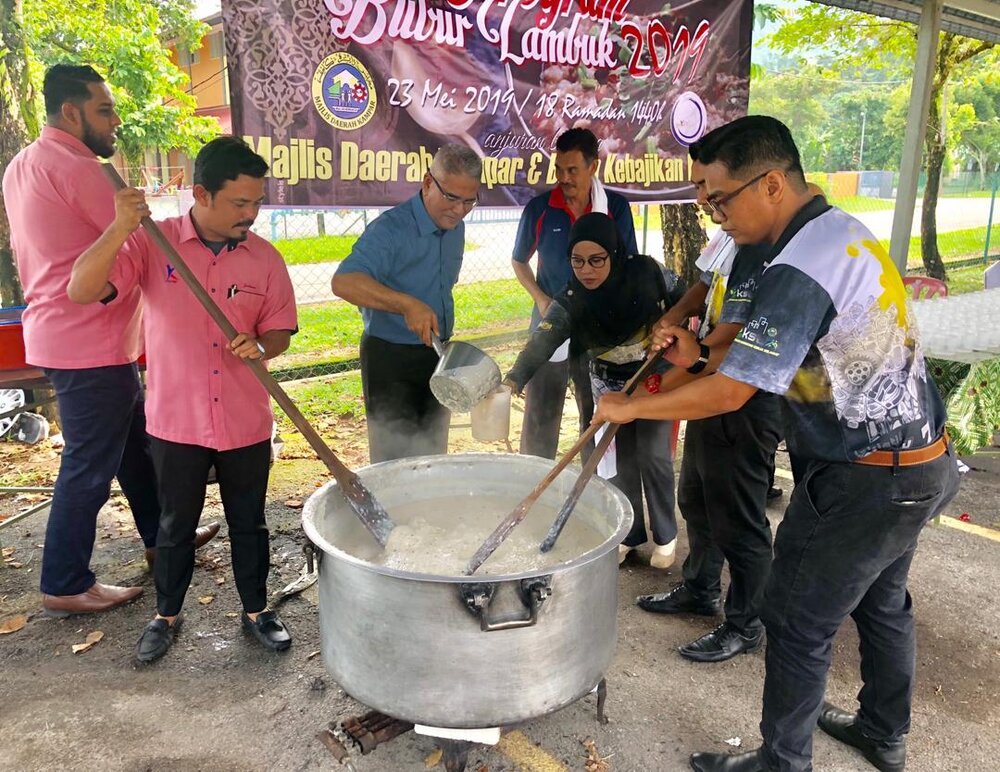

Ramadan Bazaars:
One of the most distinctive aspects of Ramadan in Malaysia is the abundance of Ramadan bazaars that spring up across the country. These bustling markets offer a diverse array of mouth-watering delicacies for iftar, like Nasi Kerabu, Pulut Panggang, and special drinks that are not usually found on normal days, creating a feast for the senses with their vibrant colors and aromatic flavors. Each bazaar offers a unique experience, making it a popular destination for both locals and tourists seeking to immerse themselves in Malaysia’s Ramadan culture. Even Buddhist and Hindu sellers fill their bazaars with Ramadan goods.

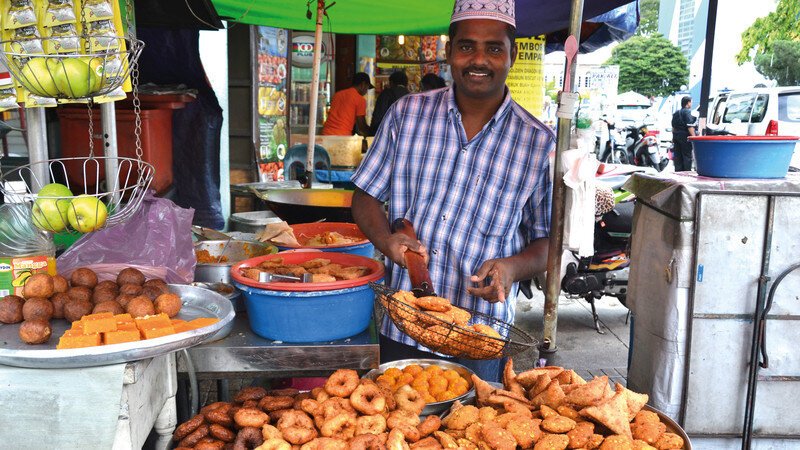
Tourism Aspect and Sahur Visitation: A Blend of Tradition and Hospitality:
The Malaysian Ministry of Tourism provides support to these bazaars as they represent a tourist attraction in the country. Additionally, the ministry has initiated the “Sahur Visitation” project, which involves providing food for orphans and the needy.
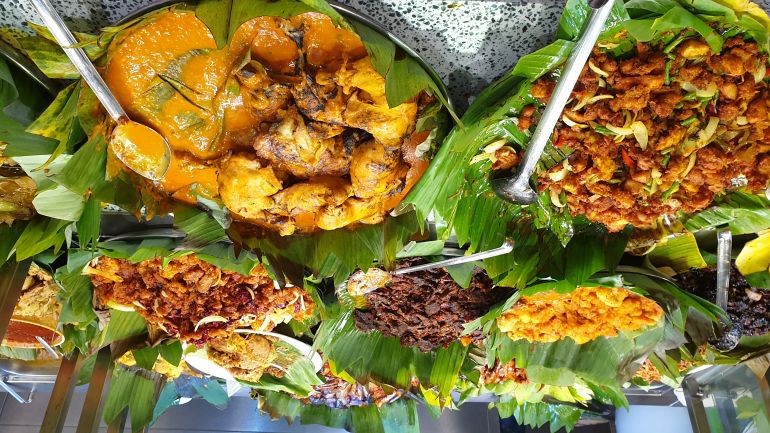
Festive Atmosphere:
Throughout Ramadan, Malaysia exudes a festive ambiance, with major shopping malls adorned in elaborate decorations and bustling markets offering great bargains on essentials. Shopping districts like Jalan Tuanku Abdul Rahman and Jalan Masjid India become bustling hubs of activity, attracting shoppers seeking last-minute Eid purchases.
A visit to these Ramadan bazaars is a feast for the senses, particularly the olfactory sense, as you’re greeted with a symphony of delightful smells wafting through the air as you stroll from one end to the other. It’s truly an experience worth savoring. Exploring a different bazaar each day adds to the excitement, as each one offers a unique atmosphere and a diverse menu of culinary delights.
Decorative Displays:
Homes adorned with twinkling lights and traditional lamps create a picturesque scene at night, evoking a sense of tranquility and celebration. Children playing with sparklers and fireworks add to the festive ambiance, making Ramadan nights in Malaysia a truly magical experience.
Mosque Iftars: A Malaysian Tradition of Community and Generosity:
Many Malaysian families gather in mosques before sunset to break their fast together. When it’s time to break the fast, dates and refreshing drinks like “Sirap Bandung Soda,” a mixture of rose water, milk, and soda, are served.

People also prioritize donating goods and bringing food to the mosque, where they stay until the evening prayers and Taraweeh. Donors often provide a light meal called “Moorah” in the mosque courtyard.
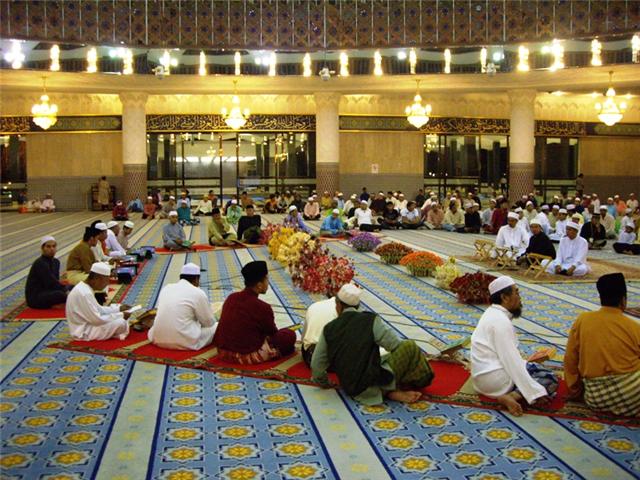
Malaysians also enjoy hosting people in their homes or outside during Ramadan for iftar, extending the invitation even to non-Muslims.
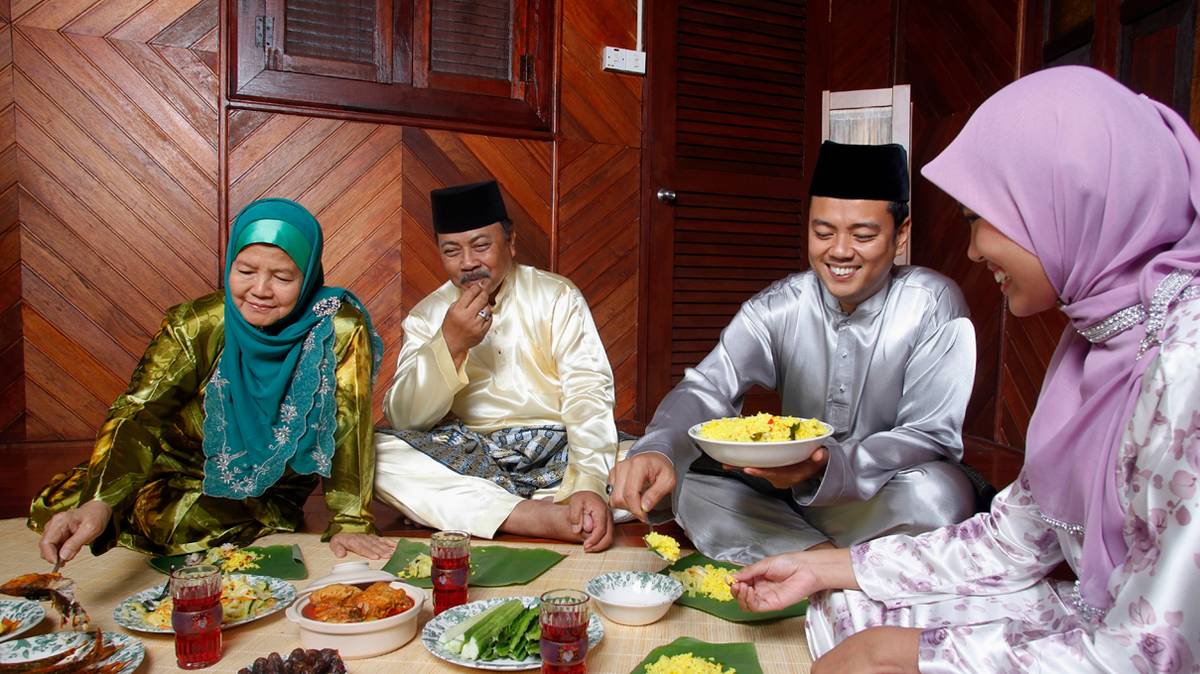

Breaking Fast at Independence Square: A Preferred Tradition during Ramadan in Malaysia:
Breaking fast at Independence Square has become a cherished tradition during Ramadan in Malaysia. As the sun sets and the call to prayer echoes across the square, families and friends gather to partake in the Iftar meal together. The atmosphere is filled with a sense of community and camaraderie as people from all walks of life come together to break their fast.

The Tradition of “Kolak” in Malaysian Ramadan Culture:
In Malaysia, it is customary for Muslims to consume a drink called “Kolak” after finishing the pre-dawn meal (suhoor). Kolak is a beverage that helps alleviate thirst and provides hydration during the daytime fasting hours of Ramadan. Moreover, it offers drinkers a boost of energy and vitality, aiding them in carrying out their tasks and responsibilities while fasting.
Tarawih Prayer and Quran Study Circles and Competitions: Spiritual Engagement in Malaysian Ramadan:
After having the main iftar meal, everyone heads to the mosques to perform the Isha and Taraweeh prayers. Muslims there perform twenty units of Taraweeh prayers in most mosques, and everyone participates in these prayers, regardless of age or gender, including elders, youth, men, and women.
Upon completing the Taraweeh prayer, religious gatherings and Quran study circles are held. Congregants gather in circles to listen to religious lessons from knowledgeable scholars. These gatherings often conclude around midnight, after which most congregants return home, while some remain in the mosque for Quran recitation and further worship.
During the last ten days of Ramadan, mosques experience a commendable turnout and a notable presence of worshipers and those who engage in i’tikaf (spiritual retreat). Mosques are almost never empty, with someone reciting the Quran, performing prayers in the mihrab, or engrossed in worshiping Allah.
Religious Competitions and Celebrations in Malaysian Mosques During Ramadan:
During Ramadan, many mosques in Malaysia organize competitions centered around the Quran and various topics in Islamic studies such as jurisprudence, hadith, and interpretation. These competitions attract participation from numerous young men and women across the country. The Ministry of Religious Affairs oversees and sponsors these events, ensuring their proper organization and providing prizes and gifts. The proceedings of these competitions are widely broadcasted through various media channels, highlighting the religious fervor and scholarly engagement during the holy month.
Mosques are Fragranced with Incense:
Mosques are fragranced with incense, and affluent individuals spray perfumes, reflecting the significance of the month in their hearts. After evening prayers and Taraweeh, congregants reconvene in mosques for Qiyam prayers and Quran recitation, indulging in fruits and sweets of their choice during breaks. Malaysian families commit to reading the Quran in its entirety at home throughout Ramadan, with Quranic recitation and mosque visits becoming focal points for all.
Youth Engagement and Religious Programs in Malaysia:
Children in Malaysia often don their traditional attire, with boys wearing rectangular-shaped caps and girls donning long, loose-fitting garments along with the Islamic headscarf. The Malaysian government takes special interest in Ramadan, incentivizing Muslim productivity through incentives and prizes. Radio stations prepare special Ramadan programs focusing on prophetic traditions, the lives of companions, jurisprudence, Quranic interpretation, competitions, and events. Mosques are filled with worshippers throughout the month, particularly during evening and dawn prayers. Post-Fajr, religious lessons and sermons are conducted until sunrise, after which people, especially business owners, engage in early morning activities with vigor, embodying a sense of vitality and productivity unique to Ramadan.

The Role of the “Musaharati” in Malaysian Ramadan Tradition:
In Malaysia, the tradition of the “Musaharati” continues to thrive, with these dawn callers present in many villages and cities throughout Ramadan, from its beginning to its end. The Musaharati roams the streets and alleys, making rounds in neighborhoods and homes, to wake people up for the pre-dawn meal, known as suhoor. Their activity typically commences approximately an hour before dawn.
Interfaith Respect and Engagement During Ramadan in Malaysia:
In Malaysia, where there are non-Muslim communities, there is a general respect for the sanctity of Ramadan among them. They refrain from eating openly during daylight hours and avoid practices that may offend Muslims. Sometimes, some of them even participate in sports activities and entertainment events held across the country. Muslims consider this participation as a means to introduce others to the reality and universality of Islam. Often, these interactions and participations yield positive results in terms of promoting Islam.
As the departure of Ramadan and the approach of Eid draw near, some graduates from schools and religious institutes form committees in mosques to collect Zakat al-Fitr. They then distribute it to the poor and needy. Additionally, some philanthropists distribute new clothes, Eid sweets, and money to the less fortunate. All of this occurs in a spirit of brotherhood and faith, reflecting the extent of solidarity and compassion among Muslims in the country. Everyone is filled with happiness and joy as Eid approaches.
Eid ul-Fitr Preparations:
Eid-ul-Fitr, known as Hari Raya Aidilfitri or Hari Raya Puasa in Malaysia, is a day of triumph and celebration for Muslims worldwide, marking the end of a month-long fast. In Malaysia, it’s a joyous occasion brimming with festive spirit and happiness. About a week before the 1st of Syawal, Malaysians embark on a journey back to their hometowns, known as the ‘Hari Raya Exodus,’ causing highways from north to south to be congested with cars.
On the 29th of Ramadan, religious authorities conduct a sighting of the new moon to determine if Eid falls the next day. The official announcement is made by the Keeper of the Rulers’ Seal on national television. The day before Eid is bustling with preparations. Families spend the entire day cooking traditional dishes and sprucing up their homes for the festivities. Traditional Eid dishes include ‘ketupat’ (compressed rice cakes in woven coconut leaves), ‘rendang’ (spicy meat dish), spicy peanut sauce, and ‘lemang’ (coconut milk-infused glutinous rice cooked in bamboo sticks lined with banana leaves). Cookie jars filled with a variety of traditional and modern cookies, known as ‘Kuih Raya,’ are also a common sight in households for guests to enjoy.
Eid ul-Fitr:
The festive spirit reaches its peak on the first day of Eid-ul-Fitr. Malaysians don fine traditional attire such as ‘Baju Melayu’ for men and ‘Baju Kurung’ for women. They start the day by seeking forgiveness from family members before heading to the mosque for Eid prayers. After prayers, they visit the graves of loved ones and then proceed to visit friends and relatives.
Eid-ul-Fitr celebrations in Malaysia extend beyond a single day to encompass the entire month of Syawal. It’s a time for strengthening personal bonds and reconnecting with friends and relatives, some of whom may not have been seen in a long time. Throughout the month, little packets of money are exchanged as an act of giving (sadaqah).
A unique tradition during Eid in Malaysia is the practice of ‘open houses’ held at almost every residence. This tradition showcases Malaysia’s harmonious multicultural existence, with houses open to guests of all social statuses, religions, and races. Guests come together to enjoy good food, company, and a memorable time, embodying the spirit of unity and inclusivity.
Celebrating Eid Throughout the Month of Shawwal:
Celebrating Eid throughout the month of Shawwal is a cherished tradition in Malaysia. Following the month of Ramadan, Malaysians continue their festivities into Shawwal, marking the end of fasting with joyous celebrations that extend for an entire month. Families gather to share meals, exchange gifts, and strengthen bonds with loved ones.
Ramadan in Malaysia is a time of spiritual reflection, communal celebration, and cultural immersion. Through cherished traditions such as bubur lambuk distribution, bustling Ramadan bazaars, and vibrant festive atmospheres, Malaysia offers a unique and unforgettable Ramadan experience for Muslims and visitors alike.
